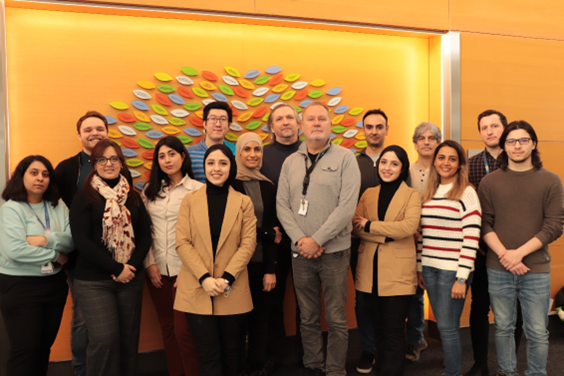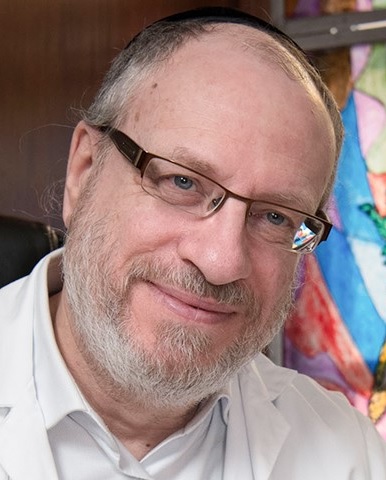Home - Laboratory - Ana Velly
The LDI/JGH Databank for Saliva Specimens is the only biobank of saliva specimens in Canada. Its collection of samples, more than 900 to date, have been used to test for bio-markers for Alzheimer and Parkinson diseases, diabetes, scleroderma, breast cancer, psychosis, oxidative stress, periodontal disease, and microbiota.
Saliva is a complex secretion whose components have a well-documented role in health and disease. In addition to its lubricant and enzyme characteristics, saliva contains biochemical systems known to be involved in soft-tissue repair, many antibacterial, antiviral and antifungal components including lysozyme, lactoferrin, salivary peroxidase, histatins, and various antioxidants. Saliva is a unique fluid and interest in it as a diagnostic medium has advanced exponentially in the last 10 years. Advances in the use of saliva as a diagnostic fluid have been affected by current technological developments. These advances in technology have helped to move saliva beyond ascertaining oral health characteristics to current assessment of essential features of overall health.
All research on human tissues involves the creation of some repository in which to store them. We are currently seeing unprecedented proliferation in the number and capacity of these biobanks, whether in terms of storage duration, quantities of banked specimens, bank sites or related financial issues. In addition, the convergent development of electronic data processing and biological material preservation gives rise to large-scale storage and leading-edge human tissue studies. Data banks and biobanks are a valuable resource providing evidence that far exceeds the anecdotal knowledge culled from limited quantities of information or biological specimens. Their scientific value lies in the possibility of collecting data or specimens from hundreds or even thousands of individuals. Analysis of large amounts of data and specimens increases the statistical power of research outcomes and thereby enhances their validity. Biobanks owe their considerable worth to these larger quantities. The possibility of correlating banked data and, also, correlating those data and biological material multiplies research resources and improves the chances of gaining new knowledge. While this technical capability allows for many such correlations, it also puts respect for privacy and personal autonomy at greater risk.

Specimens will be kept at the Lady Davis Institute for Medical Research under the responsibility of Hyman Schipper and Ana Velly. The collection will be done at least 30 min after food or liquid ingestion in sterilized centrifuge tubes after participants have received their routine check-up in the morning. To minimize temporal fluctuations in salivary redox homeostasis, all samples may be collected between 09:00am and 12:00pm. At the end of the collection period, the tube will be sealed, kept at 4°C and conveyed to the laboratory for processing as quickly as possible. Prior to analysis, the saliva will be centrifuged at 10,000 rpm for 20 min at 4 °C. The supernatant will be withdrawn and stored in small aliquot tubes at -80 °C until analysis. The salivary samples may be stored until all the saliva is used or destroyed in the laboratory of Hyman Schipper at the Lady Davis Institute for Medical Research.
Lorem ipsum dolor sit amet consectetur adipisicing elit. Maxime mollitia, molestiae quas vel sint commodi repudiandae consequuntur voluptatum laborum numquam blanditiis harum quisquam eius sed odit fugiat iusto fuga praesentium optio, eaque rerum! Provident similique accusantium nemo autem. Veritatis obcaecati tenetur iure eius earum ut molestias architecto voluptate aliquam nihil, eveniet aliquid culpa officia aut! Impedit sit sunt quaerat, odit, tenetur error, harum nesciunt ipsum debitis quas aliquid. Reprehenderit, quia. Quo neque error repudiandae fuga? Ipsa laudantium molestias eos sapiente officiis modi at sunt excepturi expedita sint? Sed quibusdam recusandae alias error harum maxime adipisci amet laborum. Perspiciatis minima nesciunt dolorem! Officiis iure rerum voluptates a cumque velit quibusdam sed amet tempora. Sit laborum ab, eius fugit doloribus tenetur fugiat, temporibus enim commodi iusto libero magni deleniti quod quam consequuntur!
Oxidative stress has been documented in tissues and biofluids of subjects with sporadic Alzheimer’s Disease (AD) and Mild Cognitive Impairment (MCI); our study demonstrated that levels of protein carbonyls, a marker of oxidative stress, exhibit robust diurnal variation in the saliva of normal elderly, MCI, and AD subjects. These observations raise the intriguing possibility that various oral pathologies and their responsiveness to therapeutic interventions may be impacted by diurnal (possibly circadian) fluctuations in salivary redox homeostasis. Another study related to AD revealed that tau and phosphorylated-tau proteins are universally present in human saliva; these preliminary results provided the basis for an ongoing Weston Brain Institute grant.
Periodontal disease is associated with increased oxidative modification of salivary DNA, lipids, and proteins. Augmented salivary total antioxidant capacity may represent an adaptive response to oxidative stress. Salivary amylase, transferrin, and human IgG1 heavy chain fragments are particularly prone to enhanced oxidation in periodontitis.
Diabetes mellitus (DM) is associated with increased oxidative modification of salivary DNA and proteins. Salivary redox homeostasis is perturbed in DM and may inform on the presence of the disease and efficacy of therapeutic interventions.
SSc subjects have more missing teeth, more periodontal disease, less saliva production, smaller interincisal distance and poorer oral health-related quality of life (HRQoL) than controls. These data can be used to develop targeted interventions to improve oral health and HRQoL in SSc. We recommend the use of adaptive devices such as flossers, powered oscillating-rotating toothbrushes and orofacial exercise to improve oral health. Aesthetics represented by facial changes may be ameliorated by various home-based exercise programs. These include mouth stretching, connective tissue massage, Kabat’s technique and a kinesitherapy program, which may improve mouth functioning and opening.
Salivary C-Reactive Protein levels appear to be related to temporomandibular disorder and to pain intensity, regardless of severity of the pain. Salivary Nerve Growth Factor (NGF) levels are associated with pain intensity only among those with severe pain, and NGF seems to be a biomarker specific for pain severity Amylase levels were not associated with pain intensity.
Our studies found that levels of 8-hydroxy-2′ -deoxyguanosine (8-OxodG) were significantly reduced in saliva of patients with breast cancer relative to control values, whereas salivary levels of the isoprostane 8-epi-Prostaglandin F2α (8-epi-PGF2α) were significantly elevated among patients with breast cancer relative to controls. In contrast, protein oxidization and total antioxidant capacity (TAC) were not associated with breast cancer. These results indicate differential salivary levels of 8-OxodG and 8-epi-PGF2α between patients with breast cancer and controls.
This is a new project where we intend to characterize the baseline state of the oral cavity microbiota, i.e. the community of microbes associated with the human body, through saliva sampling in order to assess how modifications in the microbiota are related to diseases. This is in line with the goals of the Human Microbiome Project Consortium.
Lorem ipsum dolor sit amet consectetur adipisicing elit. Maxime mollitia, molestiae quas vel sint commodi repudiandae consequuntur voluptatum laborum numquam blanditiis harum quisquam eius sed odit fugiat iusto fuga praesentium optio, eaque rerum! Provident similique accusantium nemo autem. Veritatis obcaecati tenetur iure eius earum ut molestias architecto voluptate aliquam nihil, eveniet aliquid culpa officia aut! Impedit sit sunt quaerat, odit, tenetur error, harum nesciunt ipsum debitis quas aliquid. Reprehenderit, quia. Quo neque error repudiandae fuga? Ipsa laudantium molestias eos sapiente officiis modi at sunt excepturi expedita sint? Sed quibusdam recusandae alias error harum maxime adipisci amet laborum. Perspiciatis minima nesciunt dolorem! Officiis iure rerum voluptates a cumque velit quibusdam sed amet tempora. Sit laborum ab, eius fugit doloribus tenetur fugiat, temporibus enim commodi iusto libero magni deleniti quod quam consequuntur!

After graduating with a BSc in Biology from Nebraska Wesleyan University, Koren Mann obtained a PhD in Pathology/Immunology from Boston University School of Medicine. Following that, she completed a Postdoctoral Fellowship in Oncology at McGill, where she investigated the use of arsenic as a potential chemotherapy in cancer treatment. Today, she is the Chair of the Department of Pharmacology and Therapeutics, an Associate Member of the Department of Medicine, and a Senior Investigator at the Lady Davis Institute for Medical Research.

After graduating with a BSc in Biology from Nebraska Wesleyan University, Koren Mann obtained a PhD in Pathology/Immunology from Boston University School of Medicine. Following that, she completed a Postdoctoral Fellowship in Oncology at McGill, where she investigated the use of arsenic as a potential chemotherapy in cancer treatment. Today, she is the Chair of the Department of Pharmacology and Therapeutics, an Associate Member of the Department of Medicine, and a Senior Investigator at the Lady Davis Institute for Medical Research.
Director, Department of Dentistry, Jewish General Hospital
After graduating with a BSc in Biology from Nebraska Wesleyan University, Koren Mann obtained a PhD in Pathology/Immunology from Boston University School of Medicine. Following that, she completed a Postdoctoral Fellowship in Oncology at McGill, where she investigated the use of arsenic as a potential chemotherapy in cancer treatment. Today, she is the Chair of the Department of Pharmacology and Therapeutics, an Associate Member of the Department of Medicine, and a Senior Investigator at the Lady Davis Institute for Medical Research.
After graduating with a BSc in Biology from Nebraska Wesleyan University, Koren Mann obtained a PhD in Pathology/Immunology from Boston University School of Medicine. Following that, she completed a Postdoctoral Fellowship in Oncology at McGill, where she investigated the use of arsenic as a potential chemotherapy in cancer treatment. Today, she is the Chair of the Department of Pharmacology and Therapeutics, an Associate Member of the Department of Medicine, and a Senior Investigator at the Lady Davis Institute for Medical Research.
Mitra is a research associate in the Mann Lab. After finishing her BSc in Physiology at McGill, she began her career at the Lady Davis Institute. Her project explores the role of copper, a metal commonly found in drinking water, in the progression of amyotrophic lateral sclerosis.
Braeden is a PhD candidate in the Department of Pharmacology. He completed an Honours Bachelor of Science at Queen’s University with a specialization in Drug Development and Human Toxicology. His project focuses on elucidating the consequences of organophosphate esters exposure on macrophage function.
Nivetha is a PhD candidate in the Department of Experimental Medicine. She completed her BSc in Biochemistry at Concordia University. Her project focuses on how a co-exposure to metals, such as arsenic and cadmium, affects the progression of atherosclerosis.
Madelyn is a PhD student in the department of Experimental Medicine. She uses mouse modelling to study Diffuse Large B Cell Lymphoma. In particular, she has found that mutations in the transcription factor STAT6 are enriched at disease relapse, and I study how this contributes to remodeling of the tumour microenvironment.
Rowa is a PhD candidate in the department of Experimental Medicine. She completed her BSc in Microbiology and Immunology in Saudi Arabia, then completed two MScs in Genetics and Parasitology at McGill University. Her work investigates tungsten toxicity focusing on SLC2A2 as a transporter and the effects on mature B lymphocytes.
Vincenza is an MSc. Student in the Department of Pharmacology. She completed her BSc. in Pharmacology at McGill University. Her project aims to elucidate the role of e-cigarette use on the murine cardiopulmonary system. Specifically, she is focusing on metal deposition in the lungs, and the progression of atherosclerosis due to these exposures.
Nazli Zengin is an MSc. student in the Department of Pharmacology. She has a background in pharmacology and environment. Her work currently focuses on elucidating how sex and diet modulate arsenic toxicity and its immunological and cardiovascular consequences.
Andrew is an MSc. student in the Department of Pharmacology who graduated from the B.Sc. program in Biochemistry at McGill in 2021. He works on a proteomics project centred around Arsenic 3-Methyltransferase and the question about whether it serves an additional function.
Raymond is an MSc. Student in the Department of Pharmacology who completed his BSc. in Environmental Health Sciences from the UNC Chapel Hill as a as a Morehead-Cain Scholar. He received the McCall MacBain Scholarship in 2021. His project studies the mechanism of tungsten on mTORC1, a major regulator of cell growth and proliferation.
Nikola is an incoming MSc Student who completed his undergraduate degree in
Microbiology and Immunology at McGill University. He is currently working on an NSERC
summer project that assesses the functional characterization of macrophages exposed to arsenic using murine bone marrow-derived macrophages.
Roni is a second-year BSc student in Chemistry at McGill. As an undergraduate student, she works on various projects across the lab, but is currently focused elucidating the correlation between nonalcoholic fatty liver disease and vaping.
Dr. Wilson Miller, Lady Davis Institute, Montreal
Dr. Sonia del Rincon, Lady Davis Institute, Montreal
Dr. Carolyn Baglole, RI-MUHC, McGill University, Montreal
Dr. Jun Ding, RI-MUHC, McGill University, Montreal
Dr. Susan Gaskin, Department of Chemical Engineering, McGill University, Montreal
Dr. Bernard Robaire, Department of Pharmacology McGill University, Montreal
Dr. Brandon Pearson, Columbia University, New York
Dr. John Wise, University of Louisville, Kentucky
Dr. Wilson Miller, Lady Davis Institute, Montreal
Dr. Sonia del Rincon, Lady Davis Institute, Montreal
Dr. Carolyn Baglole, RI-MUHC, McGill University, Montreal
Dr. Jun Ding, RI-MUHC, McGill University, Montreal
Dr. Susan Gaskin, Dep’t of Chemical Engineering, McGill University, Montreal
Dr. Bernard Robaire, Dep’t of Pharmacology McGill University, Montreal
Dr. Brandon Pearson, Columbia University, New York
Dr. John Wise, University of Louisville, Kentucky
Lorem ipsum dolor sit amet consectetur adipisicing elit. Maxime mollitia, molestiae quas vel sint commodi repudiandae consequuntur voluptatum laborum numquam blanditiis harum quisquam eius sed odit fugiat iusto fuga praesentium optio, eaque rerum! Provident similique accusantium nemo autem. Veritatis obcaecati tenetur iure eius earum ut molestias architecto voluptate aliquam nihil, eveniet aliquid culpa officia aut! Impedit sit sunt quaerat, odit, tenetur error, harum nesciunt ipsum debitis quas aliquid. Reprehenderit, quia. Quo neque error repudiandae fuga? Ipsa laudantium molestias eos sapiente officiis modi at sunt excepturi expedita sint? Sed quibusdam recusandae alias error harum maxime adipisci amet laborum. Perspiciatis minima nesciunt dolorem! Officiis iure rerum voluptates a cumque velit quibusdam sed amet tempora. Sit laborum ab, eius fugit doloribus tenetur fugiat, temporibus enim commodi iusto libero magni deleniti quod quam consequuntur!
Walter Gotlieb:
Melica Brodeur:
Braeden Giles:
Andrew Little:
Nikola Kukolj:
Lorem ipsum dolor sit amet consectetur adipisicing elit. Maxime mollitia, molestiae quas vel sint commodi repudiandae consequuntur voluptatum laborum numquam blanditiis harum quisquam eius sed odit fugiat iusto fuga praesentium optio, eaque rerum! Provident similique accusantium nemo autem. Veritatis obcaecati tenetur iure eius earum ut molestias architecto voluptate aliquam nihil, eveniet aliquid culpa officia aut! Impedit sit sunt quaerat, odit, tenetur error, harum nesciunt ipsum debitis quas aliquid. Reprehenderit, quia.
Dr. Wilson Miller, Lady Davis Institute, Montreal
Dr. Sonia del Rincon, Lady Davis Institute, Montreal
Dr. Carolyn Baglole, RI-MUHC, McGill University, Montreal
Dr. Jun Ding, RI-MUHC, McGill University, Montreal
Dr. Susan Gaskin, Dep’t of Chemical Engineering, McGill University, Montreal
Dr. Bernard Robaire, Dep’t of Pharmacology McGill University, Montreal
Dr. Brandon Pearson, Columbia University, New York
Dr. John Wise, University of Louisville, Kentucky
Lorem ipsum dolor sit amet consectetur adipisicing elit. Maxime mollitia, molestiae quas vel sint commodi repudiandae consequuntur voluptatum laborum numquam blanditiis harum quisquam eius sed odit fugiat iusto fuga praesentium optio, eaque rerum! Provident similique accusantium nemo autem. Veritatis obcaecati tenetur iure eius earum ut molestias architecto voluptate aliquam nihil, eveniet aliquid culpa officia aut! Impedit sit sunt quaerat, odit, tenetur error, harum nesciunt ipsum debitis quas aliquid. Reprehenderit, quia. Quo neque error repudiandae fuga? Ipsa laudantium molestias eos sapiente officiis modi at sunt excepturi expedita sint? Sed quibusdam recusandae alias error harum maxime adipisci amet laborum. Perspiciatis minima nesciunt dolorem! Officiis iure rerum voluptates a cumque velit quibusdam sed amet tempora. Sit laborum ab, eius fugit doloribus tenetur fugiat, temporibus enim commodi iusto libero magni deleniti quod quam consequuntur!
To help us attain our mission to improve the lives of those affected by gynecologic cancers, we are grateful to the funding support we receive from funding agencies and private donors. With your support, we strive to make clinical meaningful discoveries in the lab to improve patient care.
Special thanks to:
Fonds de Recherche du Québec – Santé
Canadian Institutes of Health Research (CIHR)
Gloria Girls Gloria Shapiro Foundation
Canadian Foundation for Women’s Health
Francine Grzywacz Memorial Fund
Friends for Life Foundation
Garber Fund
Israel Cancer Association
Israel Cancer Research Fund
JGH Foundation
Levy Family Fund
Reseau de recherche sur le cancer
Susan and Jonathan Wener Fund
Visman Fund of Tel Aviv University
Weekend to End Women’s Cancers
3755 Côte Ste-Catherine Road
Montreal, Quebec H3T 1E2
Email: